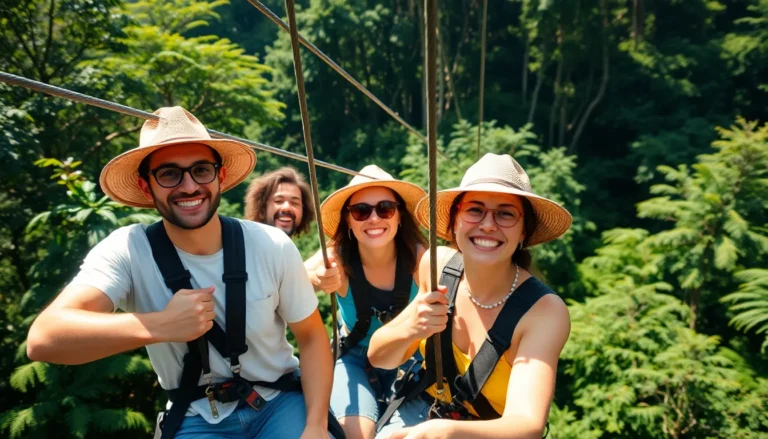Imagine sipping a coconut drink while watching sea turtles waddle their way to the ocean. That’s not just a vacation; it’s ecotourism at its finest. Ecotourism isn’t just about getting a tan on a beach; it’s about immersing oneself in nature while keeping Mother Earth happy. It’s like giving the planet a high-five while enjoying its beauty.
Example of Ecotourism
Ecotourism emphasizes responsible travel that conserves the environment and improves the well-being of local communities. Travelers engage with nature, observing ecosystems and wildlife in their natural habitats. This type of tourism promotes minimal impact activities, allowing individuals to appreciate biodiversity without causing harm.
Ecotourism destinations often highlight unique ecological features, such as rainforests, coral reefs, or wildlife reserves. Participants partake in guided nature walks, wildlife tracking, or volunteering in conservation projects. Through these experiences, visitors gain firsthand knowledge of ecological processes and local cultures, fostering respect for both.
Educational components play a significant role in ecotourism. Tour operators focus on sharing information about environmental issues and conservation efforts. This knowledge transfer encourages tourists to become advocates for preserving natural resources.
Supporting local economies represents another critical aspect of ecotourism. Community involvement ensures that economic benefits support sustainable development. Accommodations, food, and guided experiences often come from local sources, enhancing cultural exchanges and offering authentic experiences.
Visitors experience ecotourism not only as leisure but also as a transformative process. Strengthening the bond between individuals and nature cultivates a heightened awareness and responsibility toward environmental stewardship. Overall, ecotourism serves as a bridge connecting travelers to the environment and local communities, enriching their understanding and appreciation of the world’s natural wonders.
Benefits of Ecotourism

Ecotourism offers various advantages that align travel experiences with environmental sustainability and community support. These benefits significantly impact conservation efforts and local economies.
Environmental Conservation
Ecotourism promotes the preservation of natural ecosystems and wildlife habitats. Travelers engage in responsible practices that minimize environmental footprints while exploring pristine locations. Participating in activities like wildlife tracking and guided nature walks fosters appreciation for biodiversity and ecological balance. Tour operators often educate visitors about local flora and fauna, enhancing awareness of conservation challenges. Projects that involve volunteers in restoration and protection contribute directly to preserving these delicate ecosystems, ensuring future generations can enjoy them.
Economic Growth for Local Communities
Local communities experience economic benefits through ecotourism initiatives. This form of tourism emphasizes sustainable practices, creating job opportunities in both hospitality and conservation sectors. Community members benefit directly from visitor spending on accommodations, local food, and guided tours. Such benefits support small businesses, allowing them to thrive while fostering ongoing development. Increased awareness of sustainable practices encourages the community to protect their natural resources, creating a mutually beneficial relationship between travelers and residents. Transforming local attitudes toward conservation directly supports economic growth.
Notable Examples of Ecotourism
Ecotourism thrives in various locations around the globe. These examples illustrate how responsible travel contributes to environmental conservation and community well-being.
Costa Rica’s Eco-Lodges
Costa Rica showcases numerous eco-lodges that blend luxury with sustainability. Guests can immerse themselves in the rainforest while enjoying comfortable accommodations. These lodges often use renewable energy sources and implement water conservation strategies. Travelers participate in activities like birdwatching, hiking, and guided tours led by local experts. Such experiences promote awareness of local ecosystems and wildlife. Eco-lodges directly support surrounding communities by sourcing food and services locally.
Galápagos Islands Conservation Tours
The Galápagos Islands offer unique conservation tours that highlight the importance of biodiversity. Tourists engage in guided excursions led by knowledgeable naturalists who educate them about the flora and fauna. Travelers often participate in habitat restoration projects, which directly benefit local ecosystems. Some tours include wildlife observation, allowing participants to witness species found nowhere else in the world. This type of ecotourism fosters a deep appreciation for nature while generating funding for conservation efforts.
Botswana’s Wildlife Safaris
Botswana provides exceptional wildlife safaris that prioritize conservation and local involvement. Many operators follow responsible practices to minimize their environmental impact while delivering unforgettable experiences. Game drives and walking safaris allow visitors to observe majestic wildlife in its natural habitat. Local communities benefit from sustainable tourism initiatives, leading to enhanced conservation education and job creation. Safaris in Botswana often emphasize the significance of protecting the ecosystems that support these animals.
Challenges in Ecotourism
Ecotourism encounters various challenges that impact its effectiveness and sustainability. Understanding these obstacles is crucial for travelers and stakeholders in the tourism industry.
Impact on Local Culture
Ecotourism can disrupt local cultures by bringing outside influences into traditional communities. Increased tourist activity sometimes overwhelms local customs and traditions, leading to cultural dilution. Tourists may inadvertently impose their values, altering the way local residents live and work. Some communities may prioritize tourist interests over their traditions, sparking conflict. Local cultures risk losing authenticity as they adapt to visitor expectations. Promoting cultural sensitivity in ecotourism helps preserve unique local identities while allowing positive interactions.
Environmental Sustainability Issues
Environmental sustainability issues pose significant challenges within ecotourism. Overcrowding in popular ecotourism spots can lead to habitat degradation, threatening local ecosystems. Wildlife may suffer from increased human interaction, affecting behavior and reproductive patterns. Limited resources can strain local environments, leading to pollution and waste management dilemmas. Educating tourists about responsible practices is essential to minimize these impacts. Mismanagement of tourism can contradict the fundamental goal of ecotourism—environmental conservation. Addressing these sustainability concerns ensures that ecotourism remains beneficial for both the environment and local communities.
Conclusion
Ecotourism represents a powerful approach to travel that prioritizes environmental sustainability and community well-being. By engaging in responsible travel practices travelers not only enjoy unique natural experiences but also contribute to the preservation of ecosystems and local cultures. The balance between exploration and conservation is crucial for ensuring that future generations can enjoy the world’s diverse landscapes and wildlife.
As ecotourism continues to evolve it’s essential for travelers to remain mindful of their impact and support initiatives that promote sustainability. With thoughtful planning and respect for local communities ecotourism can thrive as a model for responsible travel that benefits both the planet and its inhabitants.




